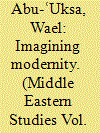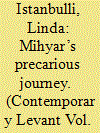| Srl | Item |
| 1 |
ID:
166763


|
|
|
|
|
| Summary/Abstract |
This article employs the methodology of conceptual history to contest two of the most common theoretical approaches dominating our understanding of modernity in the field of Middle Eastern studies. The first approach relies on the assumption of incompatibility between modernity and Islam and captures Arab modernity using concepts such as ‘adoption’. The second understands Arab modernity through concepts such as ‘imitation’, contending that it is a legacy of Western imperialism. This article challenges both theories by examining the genealogy of tamaddun (civilization, being civilized), a pivotal concept used in nineteenth-century Arabic to imagine modernity. The genealogy of tamaddun elucidates that medieval paradigms derived from the concept of madina (polity) were rediscovered, reimagined, and reused in the context of the rise of the nation-state and the challenge of Western imperialism. The article suggests understanding Arab modernity and its critique from within, rather than outside of, the temporality of the historical condition.
|
|
|
|
|
|
|
|
|
|
|
|
|
|
|
|
| 2 |
ID:
184733


|
|
|
|
|
| Summary/Abstract |
This article investigates the representations of the literary persona of Mihyar in three works by Syrian authors. First established as a central figure in Arab literary culture by Adonis in his influential 1961 poetry collection The Songs of Mihyar of Damascus, Mihyar embodies the worldviews of the progressive intellectual of the 1950s and 1960s. As it examines Adonis’s Mihyar as well as his ensuing remobilisation in Haydar Haydar’s Banquet for Seaweed (1983) and Rosa Yasin Hasan’s First Draft (2011), this article calls attention to the implications of their literary re-makings in relation to fluctuating cultural and political conditions. I argue that both Adonis and Haydar assume the persona of Mihyar to model their idealised version of the public intellectual in their own image, whereas Hasan incorporates the figure of Mihyar into her novel to dismantle him entirely. By so doing, First Draft interrogates the totalising models of sovereign paternalism that a previous generation of intellectuals had produced and the genealogy they had constructed for Arab modernity. Hasan’s work speaks to the preoccupations of a new generation of Syrian writers who share an overwhelming sense of disillusionment with both the grand narratives that had governed the cultural field and the epistemological frameworks that had given rise to these narratives.
|
|
|
|
|
|
|
|
|
|
|
|
|
|
|
|